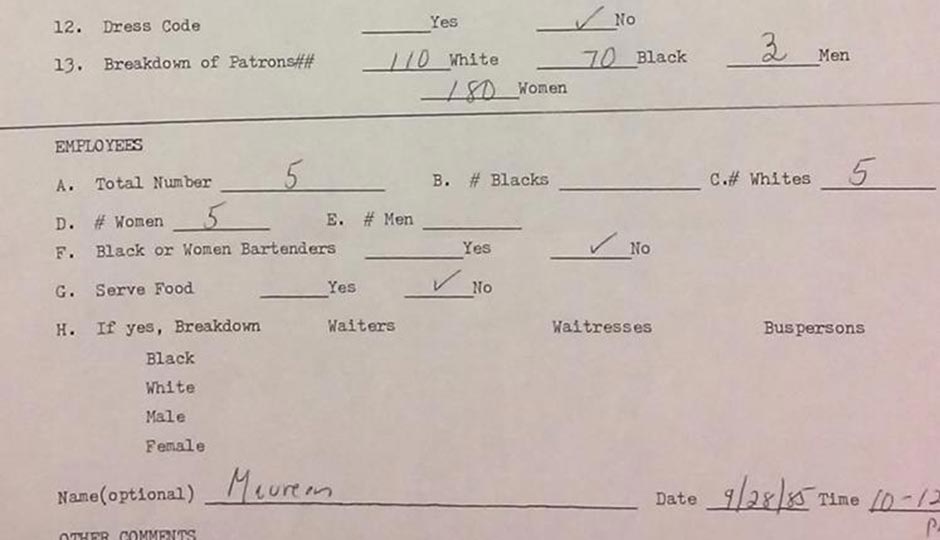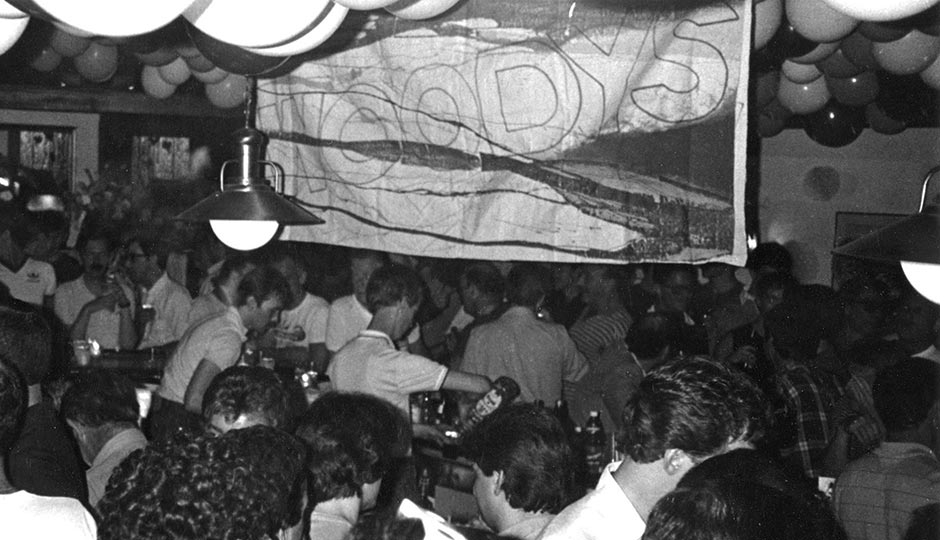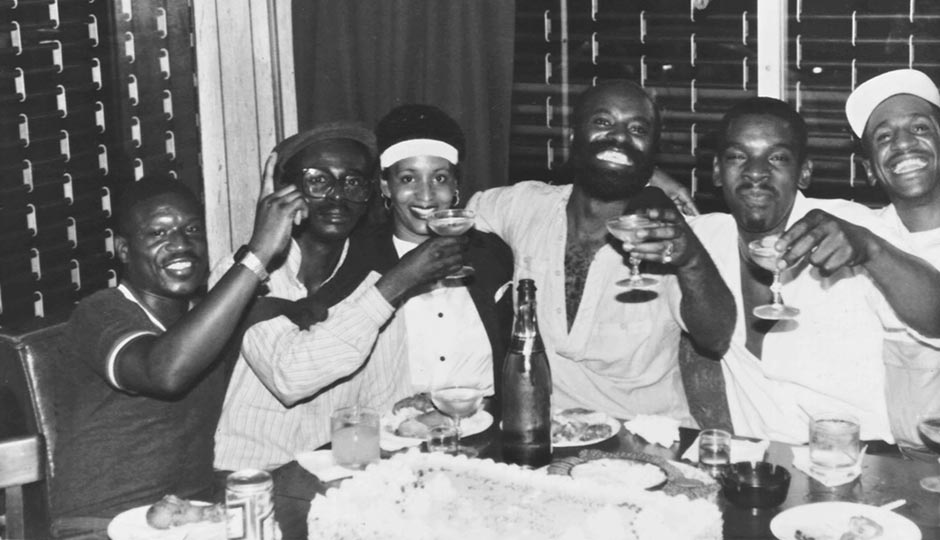Gayborhood Racism: Déjà Vu All Over Again?

Detail from a form filed by an observer who reported on the scene at Mamzelle’s, a lesbian-oriented dance club located atop the Bike Stop in the mid-1980s. Photo from the collections of the John J. Wilcox, Jr. Archives at the William Way LGBT Community Center
“What has been will be again; what has been done will be done again; there is nothing new under the sun.” — Ecclesiastes 1:9
And so it is with the curious case of iCandy, which will be one of the focal points of Tuesday’s Philadelphia Human Relations Commission hearing into discrimination at Philly’s LGBT bars.
Back in the mid-1980s, complaints similar to those recently leveled against the management at iCandy and Woody’s were rife in the community. Minorities and women alleged that they were being singled out for extra scrutiny at the most popular clubs in what was not yet called the Gayborhood. Then as now, the complaints largely centered on a few clubs with dance floors that were hugely popular with the mainstream gay male community. If you’re of a certain age, the names Equus, Kurt’s, and Key West should ring bells.
The complaints led a group of LGBT organizations concerned with social justice to form a coalition to study the issue and recommend changes. One of them was Black and White Men Together-Philadelphia, to which my then-partner and I belonged. Both of us were members of the study team the coalition put together.
We set out to conduct interviews with the owners or managers of every publicly identified lesbian and gay bar in the city and its nearby suburbs. Most of them cooperated with us; a few did not. (One of the holdouts, perhaps ironically, was the manager at Equus, which occupied the space that’s now iCandy and was one of the city’s hotspots at the time.)
These interviews were meant to establish a baseline against which to evaluate what actually went on at the door. We then sent teams of observers out on random nights, unannounced, to observe the behavior and practices of staff and bouncers at the various bars and record their observations.

Woody’s, one of the oldest bars still in operation in the Gayborhood, attracted a predominantly white clientele but was not a prime target for complaints of discrimination at the time. This photo is from its third anniversary party in 1983, well before it expanded to occupy its entire building. Photo from the collections of the John J. Wilcox, Jr. Archives at the William Way LGBT Community Center
Then as now, it was difficult to find blatantly discriminatory practices based on race or gender. One of the few policies we identified as flatly discriminatory was the practice at Kurt’s, a newcomer that was at the time the city’s hottest gay bar and disco, of waiving the nightly cover charge for patrons with out-of-state driver’s licenses.
But the feedback we were getting from the community was that this wasn’t all that was wrong with Kurt’s. Despite a publicly posted sign stating that all patrons had to produce two pieces of ID, not everyone was asked to show ID at the door, as at least one of our observers reported. One of our observers even submitted an ad from the bar that was clearly targeted at young white men.
Yet there were a few occasions when even there, the crowd wasn’t exclusively white and male. On one visit, blacks made up about 15 percent of the patrons, and on another, women accounted for 10 percent of them.
Kurt’s, however, was the exception to the rule when it came to ID policy. Most of the clubs did not request ID at the door save for one predominantly black bar where a bouncer did ask men who appeared underage to show ID, and only one other club, Key West, had a publicly posted ID policy. Ironically, none of our observers ever saw any of the door people there asking patrons to produce ID.
And so it appears that iCandy is an exception to the rule now, of sorts. Now none of the popular clubs in the Gayborhood have posted ID policies, and none have publicly posted dress codes, though there is one for the basement room at the Bike Stop. One big difference between now and then: there’s a smoking gun in the form of racist remarks from iCandy’s owner.
But back then, the most we could say in our final report (PDF) was that there was “a pattern of exclusivity” in the community’s bars and clubs. We couldn’t find any hard and fast proof of active discrimination.
One reason why it’s so hard to prove actual discrimination at bars and clubs is because patrons themselves often sort themselves out, seeking those places where they feel wanted and comfortable and avoiding those where they do not without making a fuss. It’s one reason why Tabu — which as of now is the only Gayborhood bar to formally codify an “everyone is welcome” nondiscrimination policy — often has a noticeably larger contingent of black men in it than most of the other popular Gayborhood bars.

In the mid-1980s, two Center City bars, both outside today’s Gayborhood, catered to an African-American clientele. This photo is from The Smart Place, which was located on Arch Street in Chinatown. Photo from the collections of the John J. Wilcox, Jr. Archives at the William Way LGBT Community Center
Another has to do with the tendency for gay men especially to identify as part of some sub-group or other: bears in this corner, twinks over there, the older gentlemen around the piano, drag queens upstairs in the show lounge. The bars over the years have positioned themselves to appeal to a particular sub-group in a variety of ways, most of which don’t rise to the level of what Kurt’s did or the policy that put iCandy on the hot seat.
At the end of our report, the Coalition on Lesbian-Gay Bar Policies (CLGBP) issued a set of recommendations that included educating the community about racism and sexism, adopting a uniform ID policy for all bars, and urging community groups to hold events only in inclusive environments and refuse to hold them in places that did not adopt the uniform ID policy. These recommendations were publicized in the local media but otherwise faded into obscurity.
Again, the situation at iCandy is different because there’s documented proof. Protesters are right to keep the heat on until there’s a change at this establishment. But beyond this, I strongly suspect that whatever recommendations the Human Relations Commission ultimately makes on this issue will prove as lasting as CLGBP’s were. Which won’t, however, make the whole exercise pointless, as it will have raised some people’s consciousness all the same, just as our project did. And that project laid the foundation for what’s taking place tonight.


